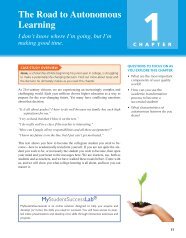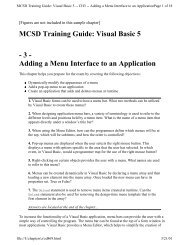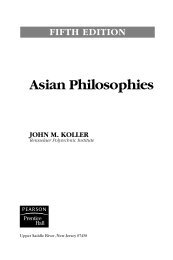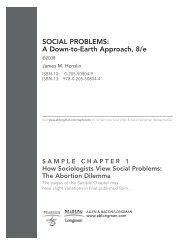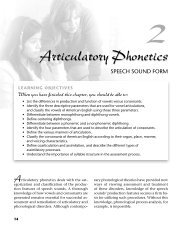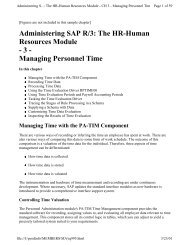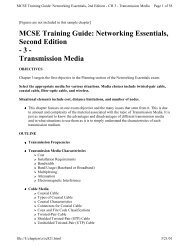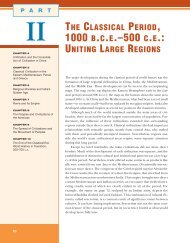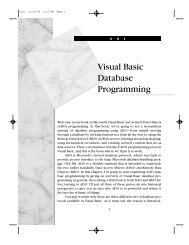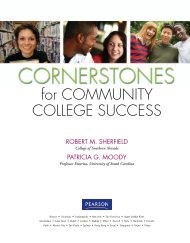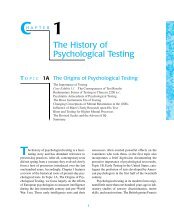CULTURE, language, AND COGNITION
CULTURE, language, AND COGNITION
CULTURE, language, AND COGNITION
You also want an ePaper? Increase the reach of your titles
YUMPU automatically turns print PDFs into web optimized ePapers that Google loves.
GA305c05.qxd 4/30/2004 11:26 AM Page 119<br />
Studying and understanding cognition during the middle and late adult<br />
years presents unique challenges, in part due to a confounding or intermingling<br />
of age and experience. Since the majority of research efforts have been<br />
conducted in Western cultures, which are youth oriented, the focus has<br />
tended to be on cognitive development among children and adolescents,<br />
not on the later years of adulthood. As a result, we know very little about<br />
changes in cognitive abilities among adults and even less from a cross-cultural<br />
perspective.<br />
Intelligence<br />
middle and later adulthood 119<br />
In their efforts to investigate changes in cognitive development during middle<br />
and late adulthood, Horn & Cattell (1967) proposed a distinction between<br />
fluid and crystallized intelligence.<br />
Fluid intelligence involves the ability to form concepts, reason abstractly,<br />
and apply material to new situations. It is thought to be biological or intuitive<br />
and to be uninfluenced by culture. It is reflected in an individual’s ability to<br />
make inferences, draw analogies, solve problems, and understand relationships<br />
among concepts. Crystallized intelligence refers to an individual’s accumulated<br />
knowledge and experience in a particular culture (e.g., ability to react to<br />
social situations or respond to classroom tests).<br />
Previous research in developmental psychology indicates that these two<br />
types of intelligence unfold in different directions. While fluid intelligence<br />
stays the same or declines somewhat throughout adulthood, crystallized intelligence<br />
may actually improve (Horn & Hofer, 1992; Lerner, 1990). Over<br />
the years, this view has been disputed on the basis of research conceptualization<br />
and methodology (Baltes, 1987; Schaie, 1984).<br />
How might the ideas of fluid and crystallized intelligence apply across<br />
different cultures? To apply this view would require an understanding of<br />
how different cultures value speed, experience, youth, and age. For instance,<br />
it has been shown that the speed of cognitive functioning tends to slow down<br />
in late adulthood (Salthouse & Coon, 1993; Sternberg & McGrane, 1993), but<br />
it is important to consider other factors when addressing this issue cross culturally.<br />
For example, it is not clear how the cultural environment will react to<br />
or even notice an individual’s cognitive slowdown. In some cases, a lack of<br />
speed might be compensated for by experience. Individuals who are admired<br />
for their experience (or wisdom) are often expected to be more reflective<br />
in matters requiring wise decisions. For example, Yang Tsu, an eighty-fouryear-old<br />
master of martial arts in China, exhibits great discipline and patience<br />
(which took many years to cultivate), when teaching his young, impulsive<br />
apprentice, Low Chi Tho, who wants to learn everything very quickly. After<br />
some time, Low Chi has come to admire Yang Tsu and to realize the need to<br />
develop a more reflective approach to learning. In short, what might be nega



